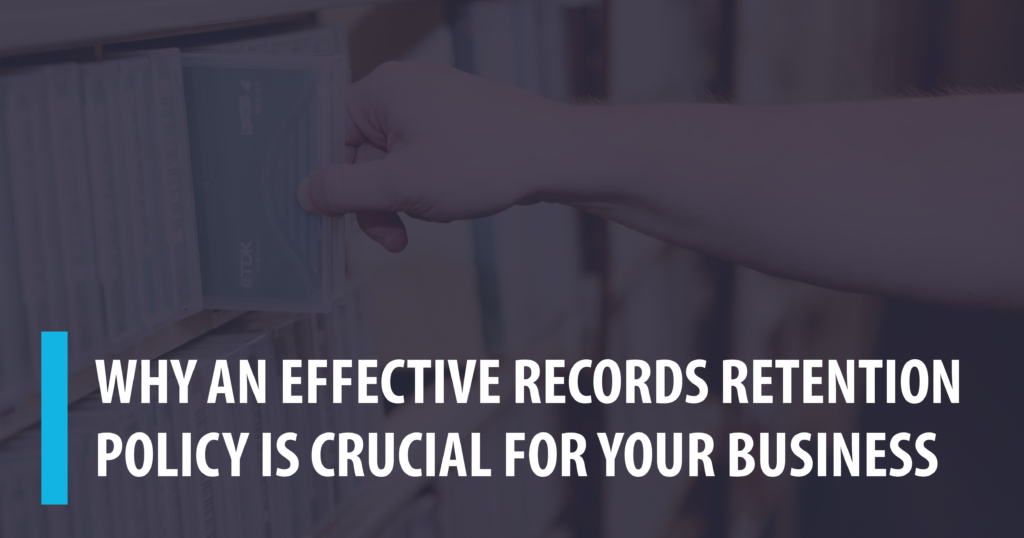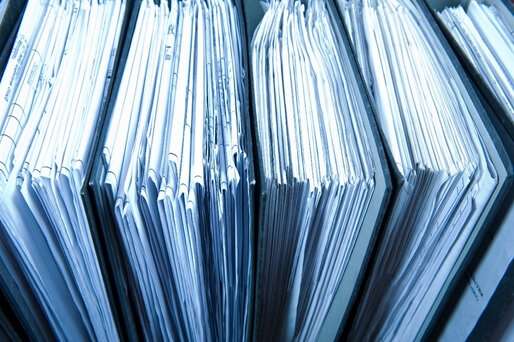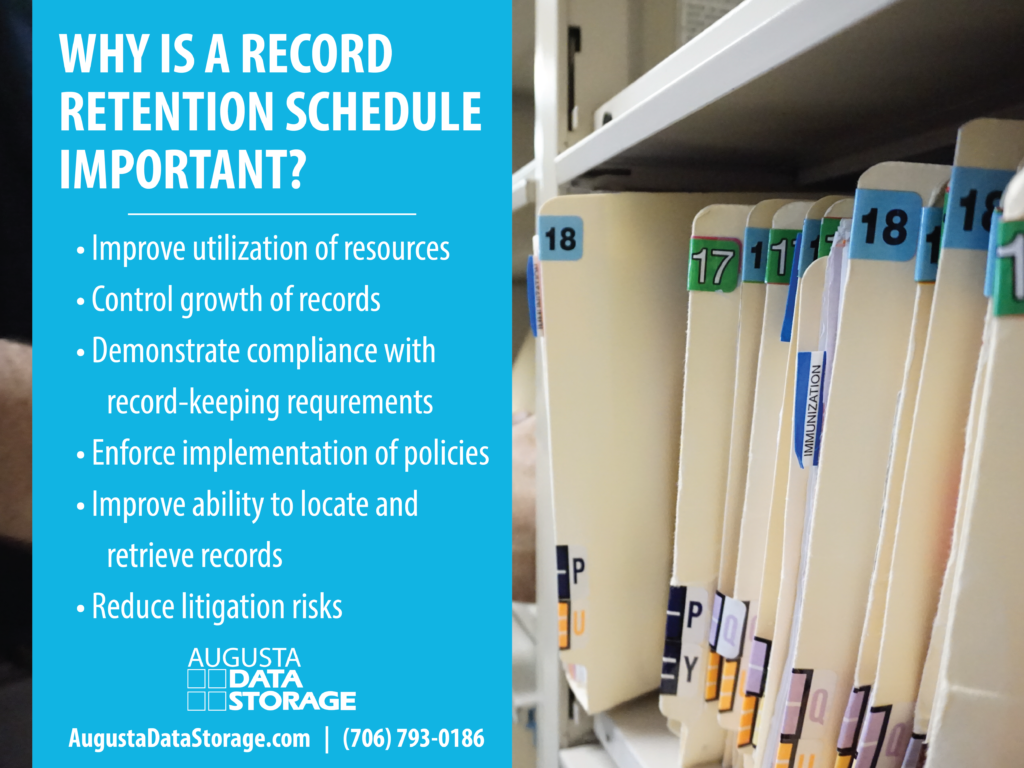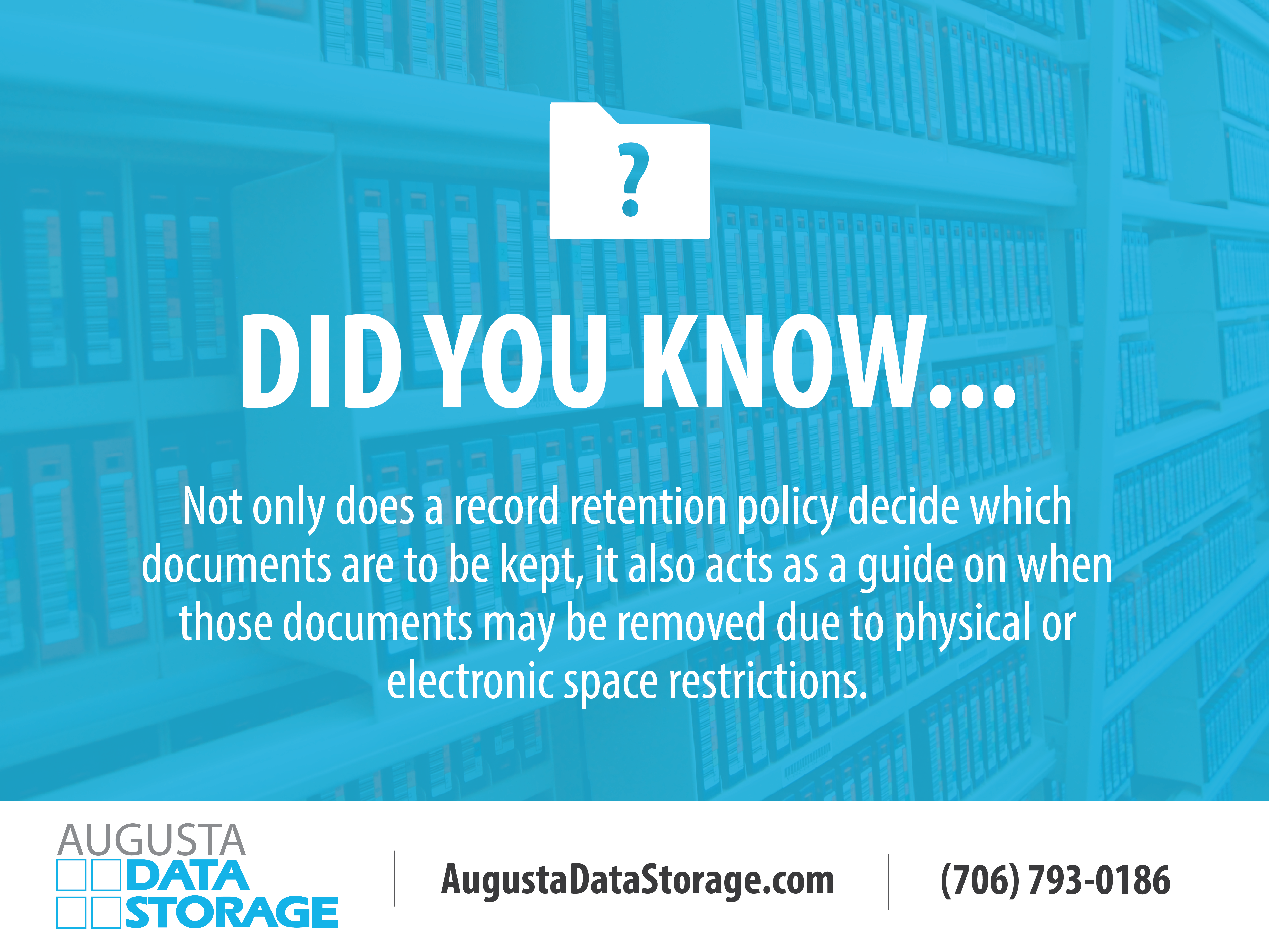Why an Effective Records Retention Policy is Crucial for Your Business

It is crucial for every business to implement and maintain a proper records retention policy. This policy indicates the retention and destruction timeframe for confidential, private documents you manage in your business. Storing records away for an indefinite period or keeping information that isn’t being used can quickly contribute to stress, clutter, and other unnecessary problems – all of which can be prevented.
Who needs a records retention schedule?
The risk of no organizational retention plan is significant for any corporation, but it is also avoidable. The development and implementation of a records retention schedule helps to ensure companies comply with state and federal information privacy laws.
As the volume of information you manage grows, so do the risk factors and potential threats when it comes to breaches. Without an established system for managing, monitoring, and purging records it can be hard to oversee the various moving pieces that make up an organization’s data and information infrastructure.

What’s the purpose of a records retention policy?
By developing and implementing a record retention schedule, an organization can:
- Improve their overall utilization of resources
- Control the growth of records volume
- Demonstrate compliance with regulatory recordkeeping requirements
- Enforce the consistent implementation of record-keeping policies
- Improve ability to locate and retrieve records when required
- Reduce litigation risks

What’s the Risk of not having a retention policy?
Information Security
Improperly managing your records can create security concerns for customers and your employees. It’s important to make sure that your retention policy addresses security and duration of storage, and also includes a secure destruction option for outdated or purged records.
Space
If you maintain a large volume of records, having adequate space and an organized storage system can be a tall order. If you are not maintaining a safe and secure storage space for your records your organization runs the risk of losing information or not being able to find it when you need it.
Time
In addition to space, consider the time it might take to find missing files and documents if they are not being properly managed. It’s important to weigh the cost of your employee’s time as you’re developing a records retention plan and weighing your options for storage.
Legal Ramifications
Did you know that by law you are required to securely store specific kinds of information? In addition, most confidential information requires records of purge and destruction dates for outdated records or those records that are no longer needed to show that your organization has done the due diligence to protect personal and proprietary information.
Some records, by law, must be stored for a specific duration, like those related to your employees and general taxes. Industries may also have unique restrictions in place when it comes to how records should be maintained Certain industries may also have further restrictions in place in relation to records retention. It is important to know the specific requirements for your business and your industry as you are building your records retention policy so that you are able to better maintain your archives and make adequate purge and destruction plans for outdated records. It’s also important to note that if your business should ever be involved in legal matters, you are legally accountable for safe storage of any records that may be of use to the case, audit, etc.
Retention policies help to manage many risks including lost or stolen information, excessive backlog of paper files, loss of time and space while internally managing records and lack of organization system for records, making them hard to find, just to name a few. Let’s say, for example, your business is faced with a legal case or audit which requires you to reference many records at once. Going through piles and piles of documents to retrieve pertinent records could become an extremely frustrating job.
Additionally, it’s always important to consider storage costs for in-house records storage, not only will you need space, but also resources to help you maintain your records annually. As they say, time is money!
Record Retention Policy Necessities
For a records retention policy to work effectively, we suggest that you consider classifying your business records into 3 basic categories:
The “Must keep” Records
These records refer to those files that you are legally mandated to store, as well as those documents requiring storage that relate directly to your company’s specific industry. Also considered should be any documents that directly relate to a potential legal problem. These particular documents should be stored for the length of time dictated by specific laws or regulations, or until they are no longer relevant to the legal dispute.
The “Wants to Keep” Records
Any record that you hold value to because of business, administrative, or marketing purposes is placed under this category. These records don’t require legal storage, but rather due to the desire to keep them. Your records retention policy should ideally provide the time period for which these documents should be retained, or at least occasionally reviewed to conclude significance and whether they continue to be important to your company.
The “Destroy/Delete” Records
Finally, the “Destroy/delete” category is exactly what it sounds like. This pile should be dedicated to anything, not in the previous two categories. It is critical that you take the initiative to shred any hard copy documents and electronic files that are either obsolete or are not being used for current business reasons storing these can be a security threat as information can quickly be lost or stolen, leaving you liable should there be a fraudulent incident as a result.
Create Retention Schedules for Hardcopy and Digital Records Management Systems
In order to properly monitor and implement the record policies, it’s important to identify the industry-specific guidelines that might impact your business. One of the key factors is determining how long you are required to store records.
The implementation of their record policies against both tangible and electronic records is a problem for many organizations. Record retention refers to the data stored in your documents, whether on paper, microfilm, microfiche or digital format. Be sure to study what guidelines the business or organization will have to obey for each document and data type. You can learn how to bridge the gap between paper and digital records for developing a more streamlined retention policy.
The importance of outlining destruction requirements within your retention schedule
A record retention policy not only advises the entity to decide which documents are to be kept, but also acts as a guide on when those documents should be destroyed, and how. Destroying documents according to a sound policy of preservation of information will help protect the company from legal risks and can create additional cost savings.
Physical storage costs include building space, electricity and maintenance rental or lease expenses. Costs for data storage include the cost of equipment, software, power usage, labor and monitoring.

Augusta Data Storage specializes in providing tailored document solutions that allow businesses to comply with legislation and ensures that sensitive information remains secure at all times.
Get in touch with us today by calling 706.793.0186!
